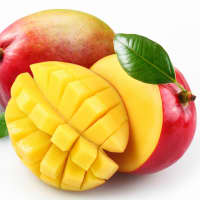Mangos (Mangifera)[1]
Composition
- Polyphenols (Phenolic Compounds)
- Syringic acid
- Ferulic acid
- Ferulic acid is an antioxidant.
- Quercetin-3-glucuronide (a dietary flavanoid)
Healing Properties
Anti-Obesity
Modulates lipid metabolism[2]
- Suppresses Adipogenesis (generation of new fat cells).
- Increases thermogenesis.
Brain Health
Cognition
Mango leaf extract Improves Cognitive Function in Healthy Adults
Mango leaf extract significantly improved brain function and cognitive performance accuracy. Results showed enhanced ‘Accuracy of Attention’ and 'Episodic Memory’. Performance was also improved across Rapid Visual Information Processing, Serial subtraction tasks, and other Cognitive Demand Battery tests. Cognitive benefits were assessed within 30 min, 3 h, and 5 h of dose. These results provide the first demonstration of cognition enhancement following consumption of mango leaf extract and add to previous research showing that polyphenols and polyphenol rich extracts can improve brain function.
Source: https://doi.org/10.3390/nu12082194
Blood Health
(Improves Vascular Health and Function)
- Improves Blood Pressure / relaxes blood vessels.
- Two cups of mango intake had acute (within two hours) beneficial effects on blood pressure (in healthy postmenopausal women).[1:1]
- Intake of mangos can influence microvascular function.
Disease / Symptom Treatment
Constipation
Menopause
- Favorable changes in breath methane (an indication of the potential influence of mango intake on gut fermentation).[1:2]
Title: Influence of Mangos on Vascular Function and Platelet Reactivity in Postmenopausal Women
Author(s): Xiang Li, Matthew A. Vanness, Roberta R. Holt, William F. Horn, Nancy L. Keim, Carl L. Keen, John G. Carson, Robert M. Hackman
Institution(s): University of California, Davis
Publication: National Mango Board
Date: January 30, 2018
Abstract: Mangos are rich in mangiferin, a phenolic acid that has multiple bioactive effects. Combined with carotenoids, fiber and other nutrients, mangos may be of benefit to vascular health. This study assessed whether a short-term (14 days) or acute (two hours) intake of mangos can influence: 1) microvascular function and the augmentation index, determined by peripheral arterial tonometry; 2) blood pressure; 3) optical platelet aggregometry, and 4) gut fermentation, determined by breath hydrogen and methane, in healthy adult women. 25 healthy postmenopausal females (BMI 25-40 kg/m2) were assessed at three study visits. Study visit 1 (SV1) started a run-in period of 14 d during which no mangos were consumed, with baseline and two-hour measures taken. At study visit 2 (SV2), baseline (0 hour) measures were taken, followed by ingestion of 300 gm (two cups) of fresh, frozen mangos, and data were collected two hours later. Participants then consumed 300 g of mangos daily for 14 days, followed by assessment at study visit 3 (SV3), which followed the same protocol as SV2. Breath samples were collected at baseline at each study visit. A significant interaction between treatment and time (p=0.005) was observed for systolic blood pressure (SBP). At baseline, SBP was not significantly different between study visits, however SBP was significantly lower two hours after mango intake during SV2 and SV3 compared to no mango intake during SV1 (112 ± 9 mmHg SV2 vs. 116 ± 12 SV1, P=0.013; 111 ± 11 mmHg SV3 vs. 116 ± 12 SV1, P=0.003). A significant treatment effect was noted for mean arterial pressure (p=0.04) with mango intake compared to no mango intake (90 ± 7 mmHg SV2 vs. 89 ± 9 SV1, P=0.04; 86 ± 8 mmHg SV3 vs. 89 ± 9 SV1, P=0.005). Pulse pressure was significantly reduced two hours after intake compared to baseline during SV2 (41 ± 7 mmHg baseline vs. 38 ± 5 2 h, P=0.005). Breath methane was significantly reduced in three of six participants that produced methane. Two cups of mango intake had acute (two hour) beneficial effects on blood pressure in healthy postmenopausal women. A number of women showed favorable changes in breath methane, an indication of the potential influence of mango intake on gut fermentation.
Link: Source
Citations: ↩︎ ↩︎ ↩︎Title: Gallotannin derivatives from mango (Mangifera indica L.) suppress adipogenesis and increase thermogenesis in 3T3-L1 adipocytes in part through the AMPK pathway
Author(s): Chuo Fang, Hyemee Kim, Giuliana Noratto, Yuxiang Sun, Stephen T. Talcott, Susanne U. Mertens-Talcott
Institution(s): Department of Nutrition and Food Science, Texas A&M University, College Station, TX, USA
Publication: Journal of Functional Foods
Date: July 2018
Abstract: Expansion of adipose tissue in obesity is associated with dysregulation of adipokines, which can lead to long-term metabolic disorders. Gallotannin derivatives from mango possess Antiinflammatory activities, but their potential role in lipid metabolism is not well investigated. In this study, 3T3-L1 preadipocytes were differentiated into adipocytes and treated with mango polyphenols (MG), or pyrogallol (PG) for 6 days. The anti-adipogenic activity of PG was demonstrated by reduced number of lipid droplets and expressions of adipogenic markers, such as peroxisome proliferator-activated receptor γ (PPARγ) and CCAAT/enhancer binding protein α (C/EBPα). In mature adipocytes, PG promoted adipocyte browning and increased the expressions of uncoupling protein 1 (UCP1) and sirtuin 1 (Sirt1). Knockdown of AMP-activated protein kinase (AMPK) α1 with siRNA partially abolished the effect of PG on adipogenesis. Results indicate that gallotannin derivatives modulate lipid metabolism, at least in part, though the AMPK pathway, and possess potential to prevent obesity-related conditions.
Link: Source
Citations: ↩︎
